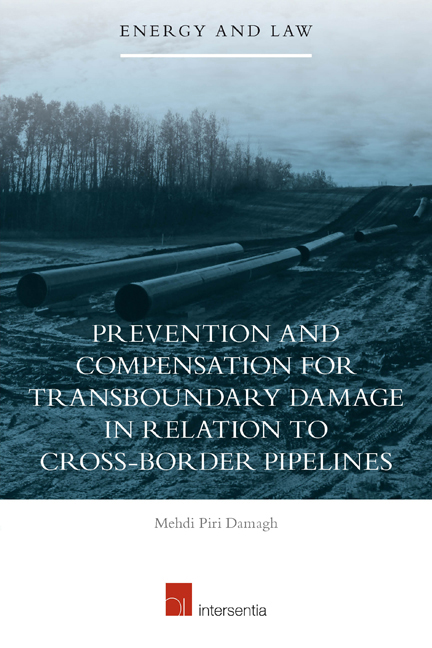Book contents
- Frontmatter
- Dedication
- Acknowledgements
- Contents
- Abbreviations
- List of Tables and Maps
- Chapter 1 Introduction
- PART I INTRODUCTORY ISSUES: PIPELINES, THE NATURE OF RISKS ASSOCIATED WITH PIPELINES AND THEIR REGULATORY REGIMES
- PART II PREVENTION OF CROSS-BORDER PIPELINE ACCIDENTS – MEANS AND SOURCES
- PART III STATE RESPONSIBILITY FOR TRANS-BOUNDARY DAMAGE CAUSED BY PIPELINES
- Introductory Note
- Chapter 8 The Origin of State Responsibility
- Chapter 9 Responsibility of States to Ensure Adequate Compensation for Transboundary Damage Caused by Oil and Gas Pipelines Laid under Their Jurisdiction and Control
- Chapter 10 Responsibility of States for Trans-boundary Damage Caused by the Prohibited Operation of Oil and Gas Pipelines
- Chapter 11 Conclusion and Policy Recommendations
- Summary
- Bibliography
- Valorisation Addendum
- Curriculum Vitae
Chapter 8 - The Origin of State Responsibility
from PART III - STATE RESPONSIBILITY FOR TRANS-BOUNDARY DAMAGE CAUSED BY PIPELINES
Published online by Cambridge University Press: 13 December 2017
- Frontmatter
- Dedication
- Acknowledgements
- Contents
- Abbreviations
- List of Tables and Maps
- Chapter 1 Introduction
- PART I INTRODUCTORY ISSUES: PIPELINES, THE NATURE OF RISKS ASSOCIATED WITH PIPELINES AND THEIR REGULATORY REGIMES
- PART II PREVENTION OF CROSS-BORDER PIPELINE ACCIDENTS – MEANS AND SOURCES
- PART III STATE RESPONSIBILITY FOR TRANS-BOUNDARY DAMAGE CAUSED BY PIPELINES
- Introductory Note
- Chapter 8 The Origin of State Responsibility
- Chapter 9 Responsibility of States to Ensure Adequate Compensation for Transboundary Damage Caused by Oil and Gas Pipelines Laid under Their Jurisdiction and Control
- Chapter 10 Responsibility of States for Trans-boundary Damage Caused by the Prohibited Operation of Oil and Gas Pipelines
- Chapter 11 Conclusion and Policy Recommendations
- Summary
- Bibliography
- Valorisation Addendum
- Curriculum Vitae
Summary
INTRODUCTION
As discussed in previous Chapters, cross-border pipelines may cause transboundary damage. As explained, private operators in charge of the pipeline operations according to domestic laws (if applicable) and depending on the contractual arrangements are obliged to prevent damage caused by oil and gas pipelines. On the other hand, states are obliged to not permit their territory to be used in such a way as to cause trans-boundary damage. Thus, a parallel set of obligations existed first for the operators (mainly private entities) and second for states. At the same time, in cases of trans-boundary, different parties, including private claimants, NGOs and even states may be injured. The question arises about who is to blame for such damage. The oil and gas pipelines, in particular cross-border pipelines can be created through the cooperation of private parties and states. Therefore, states and private actors contribute in the operation of oil and gas pipelines. Responsibility for harm caused by oil and gas pipelines, therefore, may not lie only with one single actor, but several actors may be involved in such cases. Indeed, depending on the applicable law, multiple claims by multiple claimants could be brought against multiple actors, including the source state, and the operator of the pipeline before multiple tribunals, of course in different levels. To put it in another way, there are several options for victims to file a complaint against actors involved in trans-boundary incidents. First, private claimants may bring claims against operators through domestic courts. Such claims can, depending on the applicable law, be directly brought, in the claimant state, in the place where damage was caused or the place where the operator is domiciled. Second, a claim can be brought against the state, where the harm originated, by the state, where the damage is incurred as injury to the state before an international court or tribunal in accordance with rules of international law. Third, private claimants can file a petition before an international human rights court or they can make submissions as amicus curiae before international courts and tribunals.
- Type
- Chapter
- Information
- Prevention and Compensation for Transboundary Damage in Relation to Cross-border Oil and Gas Pipelines , pp. 319 - 348Publisher: IntersentiaPrint publication year: 2015

